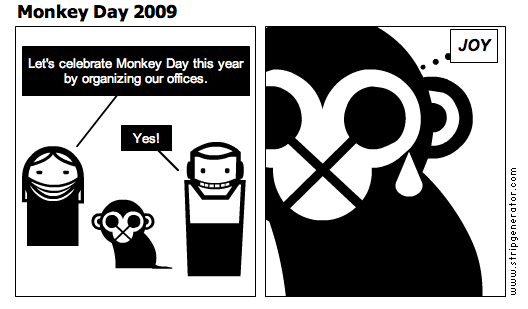
December 14 is Monkey Day. Celebrate!

December 14 is Monkey Day. Celebrate!
our new library’s official font is neutra. lulz.
if you’re not familar with lady gaga, explore her youtube page: http://www.youtube.com/user/ladygagaofficial?blend=1&ob=4
hat tip to bioephemera blog.
twitter now lets you create lists of the tweeple you follow, which allows you to group together your friends. here’s a better explanation of twitter lists: http://mashable.com/2009/11/02/twitter-lists-guide/
i just checked out the number of lists i’m on and chuckled at the categories people have put me in. i think i need to diversify my interests!
I just browsed a peer-reviewed article about marketing a specific library resource and was surprised by what I read in the Assessment section. In that section the author noted that he developed a survey to gather feedback from students on the new resource, but since submitting it for approval to the university’s Institutional Review Board (IRB) would take about a month – longer than he wanted to wait – he skipped that step. He administered the survey via the library Web site, and when that didn’t produce enough responses he asked library student supervisors to request their student workers do the survey.
I was surprised to read this because I was taught that any time a researcher involves humans in their process they have to seek IRB approval in order to make sure that the rights of those being researched are protected. That the author did not seek IRB approval was not hidden, as it is clearly stated in the manuscript. He even seems to understand the rationale of an IRB: “The university has strict human subject rules, and each survey proposal must be reviewed by the Institutional Review Board” (p. 158).
This article was published in an international, peer-reviewed journal, which means that the reviewers and the editor were okay with the IRB step being skipped. Does this mean that IRB approval isn’t necessary for library-related research, even when it involves humans? What do you think?
article citation: Cox, Christopher. 2007. “Hitting the Spot.” The Serials Librarian, 53(3): 147-164. DOI: 10.1300/J123v53n03_10
this article is not what i was intending to find during today’s browse of journal tables of contents, but i’ll take it! i’ve often wondered about how people respond spatially to all those network graphs that are popular these days. wordles and social network graphs have no horizon line, no sense of physical space to them. it has made me wonder how people relate to those representations of data without the usual grounding cues inherent in how people look at images. and, look! research on that very topic! awesome.
The natural landscape metaphor in information visualization: The role of commonsense geomorphology
Sara Irina Fabrikant, Daniel R. Montello, David M. Mark
Journal of the American Society for Information Science and Technology
DOI: 10.1002/asi.21227
Abstract: The landscape metaphor was one of the first methods used by the information visualization community to reorganize and depict document archives that are not inherently spatial. The motivation for the use of the landscape metaphor is that everyone intuitively understands landscapes. We critically examine the information visualization designer’s ontologies for implementing spatialized landscapes with ontologies of the geographic domain held by lay people. In the second half of the article, we report on a qualitative study where we empirically assessed whether the landscape metaphor has explanatory power for users trying to make sense of spatialized views, and if so, in what ways. Specifically, we are interested in uncovering how lay people interpret hills and valleys in an information landscape, and whether their interpretation is congruent with the current scientific understanding of geomorphologic processes. Our empirical results suggest that neither developers’ nor lay users’ understanding of terrain visualizations is based on universal understanding of the true process that has shaped a natural landscape into hills and valleys, mountains, and canyons. Our findings also suggest that the information landscape metaphor for sense making of a document collection is not self-evident to lay users, as claimed by information landscape designers. While a deep understanding of geomorphology will probably not be required to successfully use an information landscape, we do suggest that a coherent theory on how people use space will be necessary to produce cognitively useful information visualizations.
when i was 19 i had my palm read and was informed that i have a very short life line. i would die, the palm reader told me, “tragically young.” it’s no wonder, then, why i am the way i am; i have a lot to get done if i’m on my way out soon. a few years later when i was in grad school a professor wrote a letter of recommendation for me and noted that i didn’t fall prey to the many culs-de-sac in academia. i took that comment to heart and still replay it for myself when i find myself tempted to join in on the cause of the moment. i run through this little decision tree in my head:
there are plenty of culs-de-sac in the profession of librarianship. for example, i asked myself if adding to the rant about an anonymous author in a popular library magazine contributes to moving librarianship forward and my answer was “no”. i know this is a simplistic example, but it gets at the heart of how i choose to use my time. if my participation helps move things forward, i’ll consider engaging. if it doesn’t add value, i don’t do it; it’s off my radar.